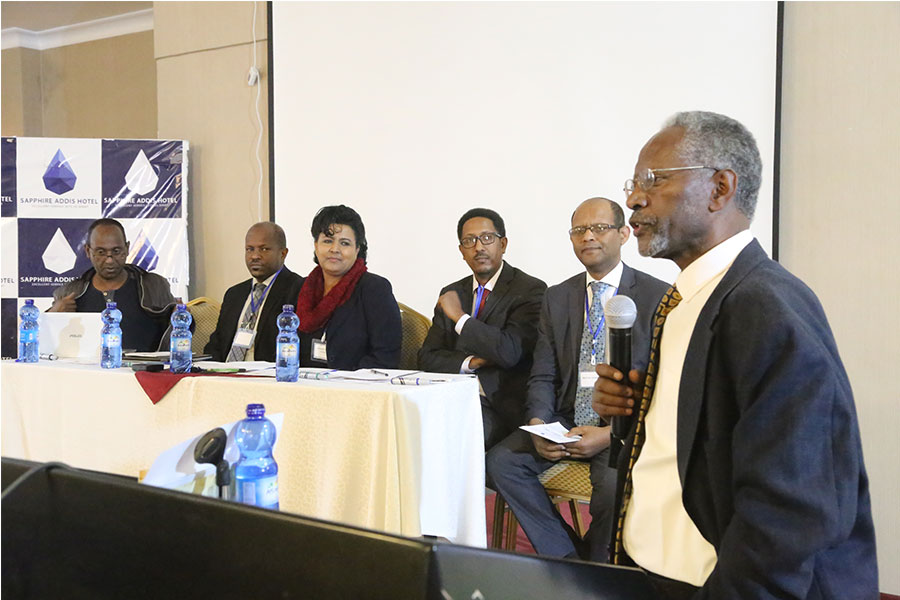
Radar | Apr 01,2024
Feb 9 , 2019
By Eden Sahle
In a country such as Ethiopia, where the government has a large stake in the economy, it is vital to craft new investment policies for development to materialise. The heavily regulated businesses sector, coupled with an unprofessional bureaucracy and a lack of checks and balances, constrains economic growth.
Although it is a commendable move to lift restrictions on foreign investment in packaging, forwarding and shipping agency services, the technology sector remains untouched at the expense of the nation’s competitiveness.
Reserving sectors exclusively to Ethiopian nationals and businesses that nonetheless do not possess the necessary skill, infrastructure or access to credit is doing more damage than benefits.
Allowing foreign firms to take stakes in local public and private establishments not only will allow knowledge transfer but make Ethiopia competitive in the global market. It is promising that the country realises opening up the economy to foreign investors is necessary to address the persistent foreign currency shortage and development in the country.
The lack of openness and engagement in value addition and capital controls will continue to have adverse effects on the competitiveness of Ethiopia’s economy. Inviting investors with high-end global services to partner with local investors will not only bring expertise but also allow Ethiopia to reach other markets with quality goods produced locally.
Improving regulations and importing skills not only offer promising opportunities for export diversification but also are key inputs in the production of quality goods for the external sector as well as domestic consumption.
Exporting processed commodities can improve the availability and quality of export items through increased competition, better technologies and access to foreign capital. This, in turn, can have a strong impact on the domestic business environment and lead to efficiency. The positive and significant trade liberalisation factor signifies the importance of implementing a more outward-looking growth strategy than controlling the market.
In Ethiopia, the level of strong economic growth and economic transformation has been low. The share of manufacturing to gross domestic product (GDP) has stagnated for over two decades, stagnating economic development initiatives. Certainly, the manufacturing sector has the potential for creating jobs that raise living conditions.
Ethiopia, despite efforts and rhetoric, has been unable to realise structural economic transformation, where the economy could modernise from agriculture to high productivity manufacturing, in what could be said is premature deindustrialisation.
The service sector is still the driver of the economy. The government keeps its hands in communication, banking, insurance, logistics and aviation, not to mention dabbling in wholesale markets. Instead of focusing on particular sectors, Ethiopia needs to move forward across all sectors, focusing on agricultural productivity improvements, manufacturing growth to support the strategy of industrialisation and the development of a service sector.
Market size of the host country, economic growth, technological capability and government policy are the key drivers of foreign direct investment (FDI). In return, FDI plays an important role in supporting economic development and growth, facilitating technological advancement and creating employment opportunities.
For poor countries such as Ethiopia, foreign investment works as a means of being incorporated into the global market and improving capital availability for investment, because trade openness promotes investment.
This will provide macroeconomic stability, show the strength of the economy and provide a degree of certainty of being able to operate profitably. The negative and significant inflation factor indicates the importance of a more focused macroeconomic policy environment that supports the economy and builds confidence for potential investors. This is where Ethiopia needs to strive.
On the same token, low inflation rates and infrastructure development have a greater positive impact on foreign investment than cheap labour, especially when skilled human power is lacking.
An efficient and educated workforce is a requirement for an attractive investment irrespective of the size of the average pay cheque. The more educated the population is, the more likely it is for Ethiopia to attract more investment. Similarly, the availability of well-developed infrastructure will reduce the cost of doing business, enabling investors to maximise the rate of return on investment.
Foreign investment inflows supported by incentives and on-going development of industrial parks will boost the manufacturing sector. The Hawassa and the Bole-Lemi industrial parks have created a glimpse of hope to increase manufacturing exports and contribute to the diversification of exports.
However, given the slow pace of tax reforms, domestic revenue is insufficient to finance the infrastructure investments expected in the national development plan, possibly resulting in larger fiscal deficits. Partnering foreign investors with the private sector could practically be explored to address the growing financial and skill constraints.
In the era of the fourth industrial revolution, driven by digital and biotechnology advances that are transforming production, Ethiopia cannot ignore the introduction of technology to the country through foreign investment. This new industrial revolution offers enormous opportunities for economic growth and sustainable development with great benefits, and Ethiopia cannot afford to miss out on it.
PUBLISHED ON
Feb 09,2019 [ VOL
19 , NO
980]

Radar | Apr 01,2024

Radar | Dec 12,2023

Radar | Sep 28,2019

Fortune News | Jul 18,2021

Viewpoints | May 17,2025

Fortune News | Jul 06,2025

Sponsored Contents | Mar 03,2022


Radar | Jan 26,2019

Fortune News | Jan 19,2019

My Opinion | 131770 Views | Aug 14,2021

My Opinion | 128153 Views | Aug 21,2021

My Opinion | 126099 Views | Sep 10,2021

My Opinion | 123719 Views | Aug 07,2021

Dec 22 , 2024 . By TIZITA SHEWAFERAW
Charged with transforming colossal state-owned enterprises into modern and competitiv...

Aug 18 , 2024 . By AKSAH ITALO
Although predictable Yonas Zerihun's job in the ride-hailing service is not immune to...

Jul 28 , 2024 . By TIZITA SHEWAFERAW
Unhabitual, perhaps too many, Samuel Gebreyohannes, 38, used to occasionally enjoy a couple of beers at breakfast. However, he recently swit...

Jul 13 , 2024 . By AKSAH ITALO
Investors who rely on tractors, trucks, and field vehicles for commuting, transporting commodities, and f...

Jul 5 , 2025
Six years ago, Ethiopia was the darling of international liberal commentators. A year...

Jun 28 , 2025
Meseret Damtie, the assertive auditor general, has never been shy about naming names...

Jun 21 , 2025
A well-worn adage says, “Budget is not destiny, but it is direction.” Examining t...

Jun 14 , 2025
Yet again, the Horn of Africa is bracing for trouble. A region already frayed by wars...

Jul 6 , 2025 . By BEZAWIT HULUAGER
The federal legislature gave Prime Minister Abiy Ahmed (PhD) what he wanted: a 1.9 tr...

Jul 6 , 2025 . By YITBAREK GETACHEW
In a city rising skyward at breakneck speed, a reckoning has arrived. Authorities in...

Jul 6 , 2025 . By NAHOM AYELE
A landmark directive from the Ministry of Finance signals a paradigm shift in the cou...

Jul 6 , 2025 . By NAHOM AYELE
Awash Bank has announced plans to establish a dedicated investment banking subsidiary...